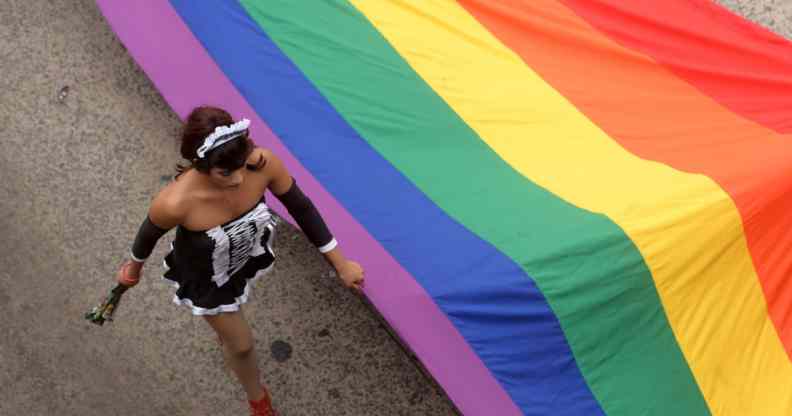Being non-binary can be grounds for asylum, court decides in historic ruling

Revelers take part in the Gay Pride Parade in San Salvador, El Salvador, on June 25, 2016. (MARVIN RECINOS/AFP via Getty Images)
Revelers take part in the Gay Pride Parade in San Salvador, El Salvador, on June 25, 2016. (MARVIN RECINOS/AFP via Getty Images)
Being non-binary can form the basis of an asylum claim, a British court has expressly ruled for the first time.
The judgment comes from the Upper Tribunal in the case of an El Salvador citizen who has been given asylum in the UK because they would face persecution for their gender identity if returned to El Salvador.
The citizen, Mx M, is non-binary but the judge concluded they would be perceived as a transgender woman and persecuted on that basis.
Considering the evidence, which includes two former dismissals of their asylum claim by lower courts, the judge said: “The appellant has already left El Salvador once because they could not tolerate the treatment that they endured there; now that they believe themselves to be far more vulnerable to attack it seems likely to me that they would feel compelled to modify their behaviour, including their political and social activism, to live ‘discreetly’.
“Having had regard to the country background evidence, and the evidence personally relating to the appellant, I am satisfied that they would do so for no reason other than a fear of persecution. It follows that… the appeal must be allowed.”
Violence against the trans community is rife in El Salvador, where three police officers were jailed in July for murdering a trans woman by throwing her out of a moving car.
In 2017, the UN called for a probe into unprecedented violence against trans women in El Salvador.
Appellant Mx M beaten up by police in El Salvador
Mx M, 29, has been twice refused asylum by a lower court. They originally claimed asylum on the basis of being gay, saying they had been subjected to a daily barrage of homophobic abuse while living in El Salvador.
This included having rubbish thrown at them and once a bag of urine. They had also been beaten up and spat at by police officers in 2013 because they chose to dye their hair blonde.
The first-tier tribunal rejected this asylum claim, saying that the abuse did not reach the threshold of “persecution” required for an asylum claim. The daily abuse, the tribunal said, “amounted to no more than discrimination”.
Mx M then made a second, fresh claim for asylum on the basis of being non-binary. They came out after living in the UK and exploring their gender identity, which has included campaigning for LGBT+ rights and speaking at conferences.
The first-tier tribunal again refused their asylum claim, but Mx M was given the right to appeal this dismissal – which is what led them to the Upper Tribunal.
Upper Tribunal grants asylum to non-binary El Salvador citizen
The judge began by asking which pronouns and titles Mx M would like to referred to by, and reminded the decision-makers in the case that they should use terminology that respects a claimants identity, in line with the Equal Treatment Bench Book for judges and Home Office guidance on Gender Identity Issues in the Asylum Claim.
The judge also criticised the previous decisions in the case, pointing out that a relevant judgement, which establishes the principle that certain identities constitute innate characteristics that people cannot be expected to change, had not been referred to when it was clearly relevant.
She was also critical of the previous judgement that found being beaten up by police officers didn’t constitute persecution, saying: “It was a physical assault, by the police, motivated by nothing other than homophobia. Five minutes is a long time to be beaten. I do not doubt that it was for the appellant a terrifying experience.”
Accepting Mx M’s non-binary identity, the judge said: “Regardless of what label we, or Salvadorans, might affix to the appellant I am satisfied that for the purpose of this risk assessment their identity is visibly ‘other’.
“When the appellant arrived in this country they wore their hair short and dark; today it is long and platinum blond. They will appear, and will be perceived, to be a transgender woman.
“Trans women, or those perceived to be trans women, are particularly vulnerable… one obvious explanation could be that unlike gay men who can try and ‘pass’ for straight, many trans women are, like the appellant, visibly different.
“I am satisfied that a trans woman, or someone perceived as such, who tries to live openly in El Salvador would face persecution which may include murder, rape and other sexual violence, physical assault and coercion into criminal activities.
“Although the state – or more accurately elements of the state – may be willing to combat such harms the weakness of the criminal justice system, including homo and transphobic attitudes by police officers, are such that there is unlikely to be a ‘sufficiency of protection’ in practice.”
The case was heard just weeks after another landmark ruling for non-binary rights, which saw an employment tribunal confirm that non-binary employees are protected from discrimination by equalities law.

